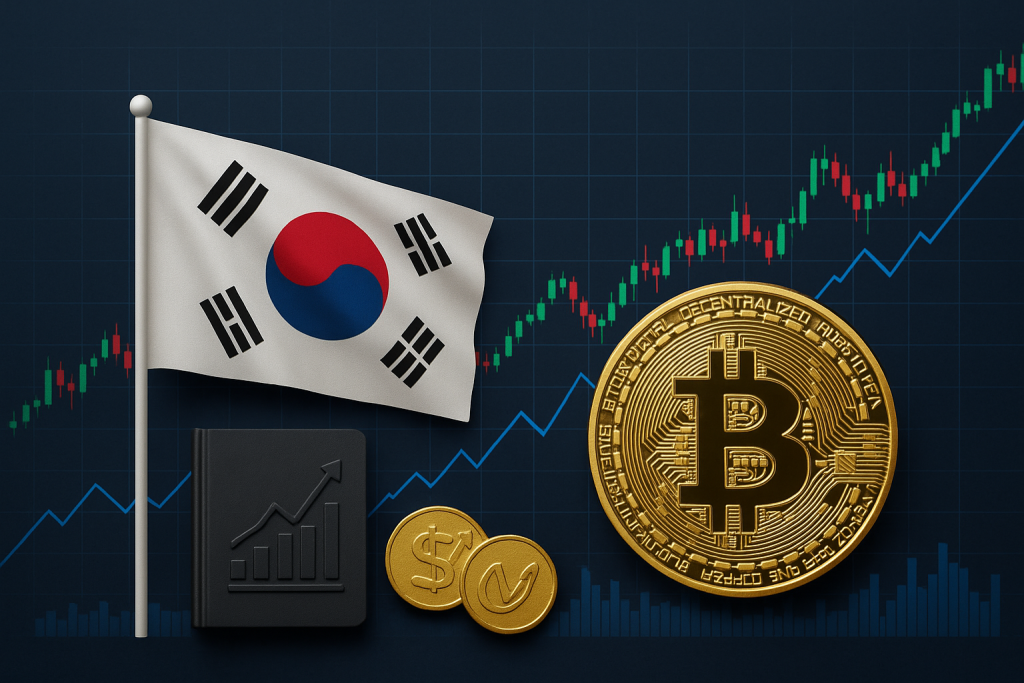Introduction
In a landmark shift that’s making waves across the global financial community, South Korea has reached a pivotal moment in its economic evolution—cryptocurrency trading has officially overtaken traditional stock market volumes in the country. This development, recently reported by Bloomberg, underscores how digital assets have moved from the fringes of financial speculation to the very core of retail and institutional investing. What makes this trend even more compelling is that it’s happening in one of Asia’s most technologically advanced and regulation-conscious economies.
While Bitcoin and Ethereum have long been at the center of crypto-related headlines, the broader dynamics of cryptocurrency trading—platforms, users, investment patterns, and market behavior—are undergoing a seismic transformation in South Korea. For years, the country has been known as a crypto hotspot. With this latest milestone, it’s now poised to serve as a blueprint for global crypto adoption. Let’s delve into what this change means, why it’s happening, and where it’s likely to take us.
The Numbers Behind The Milestone
As reported by Bloomberg, the total trading volume on South Korean cryptocurrency exchanges such as Upbit, Bithumb, and Coinone recently exceeded that of the Korea Exchange (KRX), the nation’s primary stock trading venue. The report shows that daily average cryptocurrency transaction volumes often cross $5 billion, surpassing average volumes on the KRX. This isn’t just a momentary blip—it’s an ongoing trend fueled by retail enthusiasm, favorable tax policies, mobile-first trading platforms, and increasing mainstream confidence in digital assets.
This crossover didn’t happen overnight. Crypto exchanges in South Korea have been building user trust for years through enhanced security, improved user experience, and transparent operations. By offering a wider range of tokens and altcoins compared to other global platforms, Korean exchanges have attracted a highly active user base who treat trading like a daily routine rather than a sporadic investment activity.
Cultural And Technological Drivers Of Crypto Growth
One cannot ignore the strong cultural inclination toward technology and finance in South Korea. The country boasts some of the highest internet penetration and mobile usage rates globally. Coupled with a population that’s tech-savvy and quick to adopt innovations, the rise of cryptocurrency makes logical sense. The average South Korean investor is comfortable navigating trading apps, researching blockchain projects, and engaging with digital wallets.
In addition, South Korea’s younger generation is increasingly skeptical about the traditional financial system. With high real estate prices, stagnant wage growth, and limited job opportunities, millennials and Gen Z investors are turning to crypto assets as a more accessible and potentially more lucrative alternative to building wealth. Digital currencies offer not just hope but also autonomy—values that resonate deeply with a generation looking to reshape their financial destiny.
The Role Of Government Regulation And Policies
Unlike many countries where regulatory uncertainty has hampered crypto growth, South Korea has opted for a proactive and structured approach. While crypto regulations are strict, they are also clear and well-enforced, which ironically provides investors with a sense of security. From mandatory KYC/AML (Know Your Customer / Anti-Money Laundering) compliance to taxation frameworks and licensing for exchanges, the regulatory environment has become both a challenge and a competitive advantage.
In 2021, South Korea introduced the Financial Transaction Reports Act, which requires crypto exchanges to partner with local banks and report all trading activity. This led to a shake-up in the market, with only a few major players surviving. However, these surviving exchanges are now seen as highly credible, reinforcing investor trust. Regulatory oversight has filtered out scams and ensured transparency, laying the groundwork for mass adoption.
Retail Investors At The Helm Of The Boom
The surge in trading volume is largely driven by retail investors. According to recent estimates, over five million South Koreans actively trade cryptocurrencies—a significant portion of the nation’s population. Many of these investors are in their twenties and thirties, forming a demographic that is underserved by traditional financial institutions. Unlike in the United States, where institutional players dominate crypto markets, South Korea’s market is primarily fueled by individual participants.
Retail investors in South Korea tend to be highly active, often trading on a daily basis. The accessibility of mobile trading apps, 24/7 market availability, and a strong sense of community around crypto projects have made digital assets a key part of modern financial life. Unlike traditional stocks that close at market hours, the round-the-clock nature of crypto allows users to engage any time, aligning with their fast-paced digital lifestyles.
The Altcoin Phenomenon And Market Diversity
Another unique feature of South Korea’s crypto trading environment is the widespread popularity of altcoins. While Bitcoin and Ethereum dominate global markets, Korean investors have shown a strong appetite for smaller, emerging tokens. Coins like XRP, Dogecoin, and native tokens from Korean startups see significant trading volumes on local exchanges.
This diversification has led to increased trading activity, as users frequently speculate on multiple tokens in hopes of discovering the next breakout project. The robust demand for altcoins indicates a more exploratory investment culture, where users are not just looking for safe-haven assets but are willing to take risks on promising technologies. Such behavior fuels trading volumes and reflects a vibrant, if speculative, investment climate.
Mobile-First Infrastructure And Fintech Integration
The mobile-first trading culture in South Korea is perhaps the strongest enabler of this crypto boom. Trading apps provided by platforms like Upbit and Bithumb are highly optimized for user experience. Features like instant execution, real-time data, push notifications, and community integration make it easy for users to stay engaged. Many of these apps also integrate with digital banking services, allowing users to move funds seamlessly between fiat and crypto.
These innovations lower the barrier to entry and make crypto trading accessible to a wider audience. Unlike traditional brokerages that often require a steep learning curve, crypto apps are intuitive and engaging, mimicking the UX patterns of popular social platforms. The gamification of finance, often cited as a drawback in Western markets, is embraced in South Korea as a way to increase participation and understanding.
Impact On Traditional Financial Institutions
As cryptocurrency trading volumes surpass those of the stock market, traditional financial institutions in South Korea are being forced to adapt. Banks, brokerages, and asset managers are exploring ways to integrate digital asset services into their portfolios. Some are offering crypto ETFs, while others are developing custodial services and blockchain-based investment products.
This shift is not without tension. While regulators remain cautious about fully opening the financial system to crypto, the market’s momentum is undeniable. Institutions that resist change risk losing relevance, while those that adapt early stand to capture new revenue streams and client segments. The growing competition between crypto-native platforms and legacy institutions is likely to drive further innovation in financial services.
Psychological And Behavioral Shifts Among Investors
The psychology of investing in South Korea has also evolved. Traditional notions of long-term investing and conservative portfolio management are being replaced by agile, short-term trading behaviors. Investors are no longer content with modest annual returns—they seek fast gains, often driven by social media trends, influencer opinions, and community-driven narratives.
This shift has profound implications for financial education and investor protection. While crypto trading empowers individuals with more control, it also exposes them to high levels of risk and volatility. The government and private sector are beginning to respond with educational campaigns aimed at promoting responsible investing and risk management strategies.
Challenges And Risks In The Current Landscape
Despite the encouraging signs, the surge in crypto trading also brings challenges. Market volatility, cyber security threats, and emotional investing are ever-present risks. Furthermore, the Korean crypto market remains somewhat isolated from global trends, often displaying price discrepancies due to limited arbitrage and exchange controls—a phenomenon known as the “Kimchi Premium.”
Additionally, the speculative nature of many altcoins traded in Korea could lead to asset bubbles and investor losses. While regulation helps mitigate some of these risks, the speed at which the market evolves often outpaces legal frameworks. Ensuring stability while fostering innovation remains a difficult balancing act for policymakers.
The Road Ahead: What Does The Future Hold?
South Korea’s transition into a crypto-first trading nation may signal a larger global shift. As the line between traditional and digital finance blurs, countries around the world will be watching closely. The success of South Korea’s regulatory model, fintech infrastructure, and user adoption could serve as a template for broader integration of crypto into national economies.
Looking ahead, one can expect further convergence between DeFi (Decentralized Finance) and TradFi (Traditional Finance) services in the Korean market. Innovations like tokenized assets, blockchain-based identity verification, and crypto-based savings plans are already in development. With continued government support, technological innovation, and user enthusiasm, South Korea is well-positioned to lead the next phase of the financial revolution.
Conclusion
The rise of cryptocurrency trading in South Korea to levels surpassing traditional stock markets is more than a local trend—it’s a global signal. It marks a decisive pivot in how the next generation views money, investing, and economic opportunity. Driven by a perfect storm of technological innovation, mobile accessibility, cultural openness to change, and a younger population hungry for financial empowerment, South Korea has become a living case study in digital financial transformation.
As the lines continue to blur between digital and traditional finance, South Korea’s model presents both a challenge and an inspiration to other nations. Governments, regulators, financial institutions, and investors worldwide will watch closely to understand what works, what needs reform, and how digital assets can be responsibly integrated into the global economic system.



